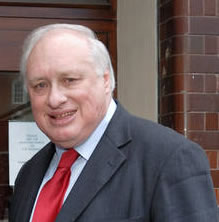Report from the AGM, 22 March 2003

Stephen Haseler: Re-thinking NATO – a European declaration of independence
The acute crisis in the Atlantic Alliance over Iraq that burst upon the scene in early 2003 had been building for over a decade. And could have been predicted. The key to the current crisis is not to be found in the events of 11 September 2001; rather, they are the product of events some 12 years earlier when the collapse of the Soviet Union removed the Soviet threat to Western Europe. It was this threat which had cemented post war American-West European relations, had created and sustained NATO, and caused most Europeans to willingly acquiesce in American leadership of the alliance. If 9/11 “changed everything” for Americans, then, some 12 years earlier, the end of the Berlin Wall had “changed everything” for Europeans. For, with the Soviet threat removed, the cold war pattern of the European-American relationship was bound, sooner or later, to be re-assessed, and altered.
This fundamental re-assessment was, though, to be set aside almost as soon as it started. For the whole post cold war NATO debate was submerged following the eruption of the Gulf war. All the leading European governments, as part of an impressive international coalition, supported the US in expelling Iraq from Kuwait – and the war amply displayed how American military leadership was highly beneficial to Europe when European and American interests coincided. In this environment few in Europe, outside of France, were prepared to question the underlying rationale for NATO. And NATO also received a last minute reprieve as the Yugoslav imbroglio seriously dented the claims of those who sought an independent European security policy.
From Washington’s perspective, NATO was now seen in a totally different light. As long as it remained American-led it remained highly worthwhile. During the cold war years the alliance had often caused irritation in Washington. Powerful voices in the US Congress regularly argued that the US was spending too high a proportion of the US defence budget on ‘NATO related’ expenditure and that US tax-payers were bearing too much of the NATO burden. And successive US administrations became frustrated with the regular refusal of the European members of NATO to engage the alliance in ‘out of area’ (that is, out of Europe) operations.
During the 1990s, throughout their opposition years during the Clinton Presidency, strategic thinking in Republican, conservative and neo-conservative circles was attempting to redefine the role of the USA. In Washington think-tanks like the conservative Heritage Foundation, the neo-conservative American Enterprise Institute and foreign policy institutes like the Georgetown Centre for Strategic and International Studies, strategists were developing new geo-strategic ideas – and they were clustering around the over-all concept of ‘US hegemony’. This stark idea took root in the belief that following the collapse of Soviet power the US had graduated from being the leader of the west in a bi-polar system to the world’s only superpower – a notion given extra life when the French Foreign Minister, Hubert Védrine, described the US as the world’s “hyper-power”.
This developing vision of the US as the world’s policeman was still a minority interest, contained and held at the margins of Washington life, when the terrorists struck the Twin Towers in New York and the Pentagon on 11 September. And, then, in the then current usage, “everything changed”. What in fact changed was the historic popular sense of the invulnerability of America. This new vulnerability to terrorism, together with the sensationalism of the powerful and permeating US news media, only increased the sense of fear. In this new domestic environment, Americans were prepared to vest authority to deal with the crisis in the President, and the conservatives and neo-conservatives around George W Bush were able to convince him to adopt a radically new geo-strategic course.
But, although for some time it has been clear that Europe and America have different, often divergent, interests, there still remains a strong, residual belief (or instinct) : that Europe needs America as its ultimate security guarantor. (This is an instinct still strongly held amongst the British elites, but also amongst other Europeans too.) This instinct remained even though the post cold war threats to Europe were completely different from those of the Soviet era. During the cold war the overwhelming threat was from the Soviet Union; but in the post cold war environment the security threats are primarily terrorist threats and, potentially, threats from anti-western ‘rogue states’. The major difference between these new threats and the cold war threat is that a prosperous and increasingly united Europe has the resources and the ability to handle them itself. Indeed, we cannot, and should not, expect the US to handle them for us. Apart from the question of dignity, US tax-payers will simply not be prepared (with their coming serious deficits and their global mission) to add to their burdens by funding the security of equally prosperous Europe.
In this new strategic environment, Europe needs a close European-American relationship in a Trans-Atlantic Community in which equal partners ensure good trade relations, close intelligence sharing and anti-terrorist co-operation, and, when agreed, even military interventions abroad. Quite simply, Europe does not need America – anymore than America needs Europe – for its fundamental defence and security. Indeed, because the US is pursuing a new global mission it may need Europe rather more than Europe needs the US, as Washington may want European resources to help out, and would certainly need Europe as a launching pad for global military operations.
It now seems likely that with or without Britain, a new European security system, either as a refinement of NATO or a replacement for it, will eventually come into being. And as it emerges – rather like the euro – it will face Britain with a simple choice: to enter, and to help mould and determine its development, or to stand off from it, and make its way in an uncertain world.

Richard Perle argued recently that the future of the United Nations was being threatened not by the United States but by the European opponents of war. He compared it with the League of Nations which, he said, had failed to act against aggression and had therefore lost credibility.
In the last few weeks, I have been reading (or in some cases, re-reading) various books on the 1930s, and the most perceptive analysis of the failure of the League of Nations that I have found was in “Why war?” by C E M Joad. He was a leading member of Federal Union in the 1930s and 40s, and in this book he lays out a powerful case for federalism. On the league of Nations, he says, it should not be thought of as an impartial world body, impartial that is as to the competing demands of different countries, but rather as a part of the post-first world war settlement, devoted to maintaining and enforcing the terms of the Versailles treaty. That treaty, of course, had been widely discredited by the time of the 1930s – only two countries, Britain and France, still stood by it. (They were, probably not coincidentally, the two biggest beneficiaries of it.) So, by the time that the Japanese invaded Manchuria or the Italians invaded Abyssinia, the League of Nations had lost credibility and was therefore unable to act. This is exactly the opposite way round from Richard Perle’s description.
Looking at the UN today, we have a very similar position. The United States is projecting on to the UN its own interpretation of the various resolutions and denouncing the UN because it will not act. The other member states of the UN did not act precisely because the United States was engaged in its own interpretations of the resolutions. We should think twice before relying on Richard Perle’s vision of the global institutions.
I think this kind of discussion is important for Federal Union, because it takes us back to where the organisation started. There has been a sense in the last few weeks and months of a kind of phoney war: we know it is coming but it has not started yet. The early days of Federal Union were lived in the same feeling: the problem moved from how to prevent the war to what the war should be fought for once it had started. I have included John Ryle’s statement of peace aims from February 1940 in the pack for this AGM – I think it reflects the way that we should be thinking today.
Jeremy Hargreaves spoke this morning about the extent to which the European Union is pretty much like a federation already. One of the problems we have had in explining the merits of federalism to the general public is that the difference that federalism might make has not been very clear and, even when it has been clear, it appears to have been small. If co-decision for the European Parliament and the election of the Commission president by the MEPs is all we are asking for, what is all the fuss about?
The American approach to global problems has demonstrated clearly what all the fuss is about. We now have the alternative to our view of the world on public display. It is very sad that it has taken the Americans, with whom the Europeans have so much in common, to show quite important it is that Europe finally starts to act in a united manner on the world stage, advancing its own approach to international relations and world order.
And despite all the adverse publicity, I think that it is very possible that Europe can do this.
It is no accident that the biggest European demonstrations against the war have been in Spain, Italy and the UK, the three countries that are most committed to it. I think that there is a common European view of the Iraq crisis, but at present three national governments do not share it. That gives me confidence that there is great scope for a European position on issues of this sort, as long as there are both the institutions and the will to do so. Everyone will be better off if we do.
This article is based on talks given by the two speakers at the Federal Union AGM on Saturday 22 March 2003. The opinions expressed are those of the speakers and not necessarily those of Federal Union.
More information
Report on the AGM held on 22 March 2003
Report on the AGM debate on the European Constitutional Convention
